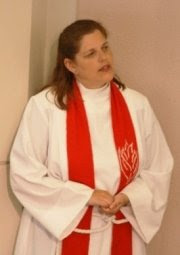Miranda (the sister of Flavia) is a sober, reasonable
Christian: as soon as she was mistress
of her time and fortune, it was her first thought how she might best fulfill
everything that God required of her in the use of them, and how she might make
best and happiest use of this short life.
She depends upon the truth of what our blessed Lord has said, that there
is but “One thing needful,” and therefore makes her whole life but one
continual labor after it. She has but
one reason for doing or not doing, for liking or not liking anything, and that
is the will of God. She is not so weak
as to pretend to add what is called the fine lady to the true Christian; Miranda
thinks too well to be taken with the sound of such silly words; she has
renounced the world to follow Christ in the exercise of humility, charity,
devotion, abstinence, and heavenly affections.
Miranda does not divide her duty between God, her neighbor,
and herself; but she considers all as due to God, and so does everything in God’s
Name, and for God’s sake. This makes her
consider her fortune as the gift of God, that is to be used, as everything is
that belongs to God, for the wise and reasonable ends of a Christian and holy
life. Her fortune therefore is divided
between herself and several other poor people, and she has only her part of
relief from it. She thinks it the same
folly to indulge herself in needless, vain expenses, as to give to other people
to spend in the same way. Therefore as
she will not give a poor man money to go see a puppet-show, neither will she
allow herself any to spend in the same manner; thinking it very proper to be as
wise herself as she expects poor men should be.
For it is a folly and a crime in a poor man, says Miranda, to waste what
is given him in foolish trifles, while he wants meat, drink, and clothes.
It may be, says Miranda, that I may often given to those
that do not deserve it, or that will make an ill use of my alms. But what then? Is not this the very method of Divine goodness? Does not God make his “sun to rise on the
evil and on the good”? Is not this the
very goodness that is recommended to us in Scripture, that, by imitating of it,
we may be children of our Father in Heaven, who “sends rain on the just and on
the unjust”? And shall I withhold a
little money, or food, from my fellow-creatures, for fear they should not be
good enough to receive it of me? Do I
beg of God to deal with me, not according to my merit, but according to God’s
own great goodness; and shall I be so absurd as to withhold my charity from a
poor brother or sister, because they may perhaps not deserve it? Shall I use a measure towards them, which I
pray God never to use towards me?
You will perhaps say, that by this means I encourage people
to be beggars. But the same thoughtless
objection may be made against all kinds of charities, for they may encourage
people to depend upon them. The same may
be said against clothing the naked, or giving medicines to the sick; for that
may encourage people to neglect themselves, and be careless of their
health. But when the love of God swells
in you, when it has enlarged your heart, and filled you with bowels of mercy
and compassion, you will make no more such objections as these.
This is the spirit, and this is the life, of the devout
Miranda; and if she lives ten years longer, she will have spent sixty hundred
pounds in charity, for that which she allows herself, may fairly be reckoned
amongst her alms.
When she dies, she must shine among Apostles, and saints,
and martyrs; she must stand among the first servants of God, and be glorious
among those that have fought the good fight, and finished their course with
joy.
She considers all as
due to God.
On what basis do we
give? How do we balance stewardship
& alms? What is the difference
between personal and impersonal almsgiving.
From A Time To Turn by Christopher Webber

